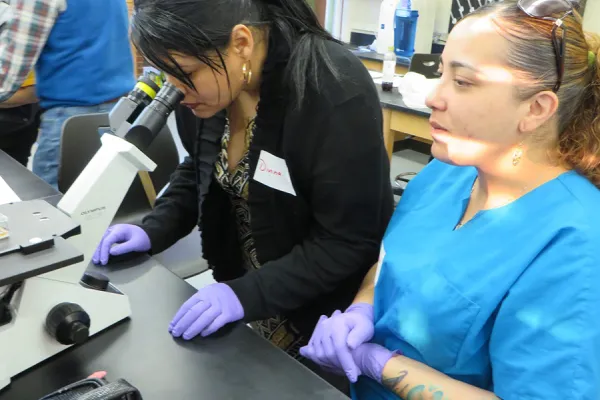Cancer Up Close: Students Create Lab Lessons for Adult Learners
Campus Life

Published June 18, 2015
About five years ago, the Clark Science Center’s outreach office began partnering with Holyoke Community College’s Adult Learning Center to help enhance science instruction and create an opportunity for Smith students to work with an adult literacy program.
Since then, teams of Smith students have worked with laboratory instructor Judith Wopereis, Allison Sirois, a master of science degree candidate in the Department of Biological Sciences, and myself, to develop and teach a variety of science-based lessons to adults at the Holyoke center.
(In addition to HCC’s adult literacy program, Smith’s Science Outreach office also works with the Literacy Project in Northampton and Amherst.)
Smith students who volunteer with these programs do so for a variety of reasons. Many of our students help out because of their passion and interest in the sciences but others jump in because of their interest in social justice, immigrant support, education or to give back the community. These collaborations benefit all involved and give Smith students an opportunity to make a difference in our region.
Recently, a team of four Smithies created a unique classroom project that combined a historical reading assignment with a standard microscopy activity about plant and animal cells.
It was a privilege to be part of their journey and to be able to teach them things they never knew before.
Here’s how the project came about.
Last fall, students at the adult learning center read The Immortal Life of Henrietta Lacks by Rebecca Skloot. The book is about an African American woman whose cancer cells were the source of the first human immortal cell line for medical research. The cells, known as HeLa, were cultured without Lacks’ consent.
Smith students Sahar Aftab ’18, Suzanne Abreu ’17, and Amalia Driller-Colangelo ’18 thought it might be cool to offer the adult learners a chance to actually see HeLa cells in the lab and learn more about cancer. With help from Wopereis, Sirois and Sarah Moore, an assistant professor of engineering at Smith, the students set about obtaining the safety protocols needed to get HeLa cells cloned from Henrietta Lacks for a classroom activity for the HCC students.
During the two-hour activity at Smith, the adult learners were able to observe live HeLa cells under a microscope and hear about how cancer cells grow—both in human tissue and in incubators.
The results of the lesson were “truly amazing,” said Aliza Ansell, program coordinator for the HCC program. “Judith and the student team went way above and beyond by putting together a presentation specifically tailored for our class.”
Sirois said it was “refreshing to see students be so enthralled in an activity.” She noted that the adult learners were able to draw from their personal experiences and ask questions “that showed they are truly interested in learning.”
Abreu said Smithies also learned from developing and teaching the HeLa lesson to the adult students.
“It was a privilege to be part of their journey and to be able to teach them things they never knew before,” Abreu said.
“Doing this work teaches me that not everyone goes through the same path of attending college or even finishing high school,” she added. “I learned that people with different histories still want to pursue degrees and make their lives better by seeking higher education.”
Divina Martinez, a student in the HCC program, had this review of her time in the lab at Smith: “Seeing the HeLa cells was amazing. It was one of the best field trips I’ve been on. Can we go back?”
Smith students will be able to sign up this fall for new outreach experiences.
Contributed by Thomas Gralinski, science outreach coordinator, Center for Community Collaboration.
Students from the adult literacy program at Holyoke Community College observe cancer cells in a lab at Smith. Photo by Tom Gralinski.